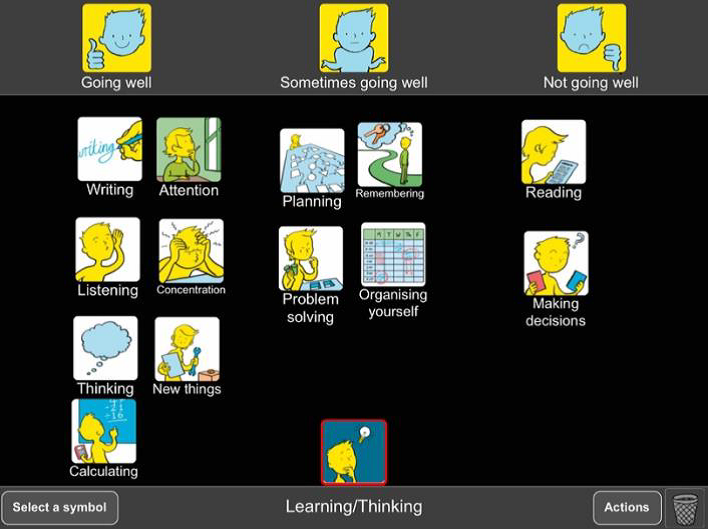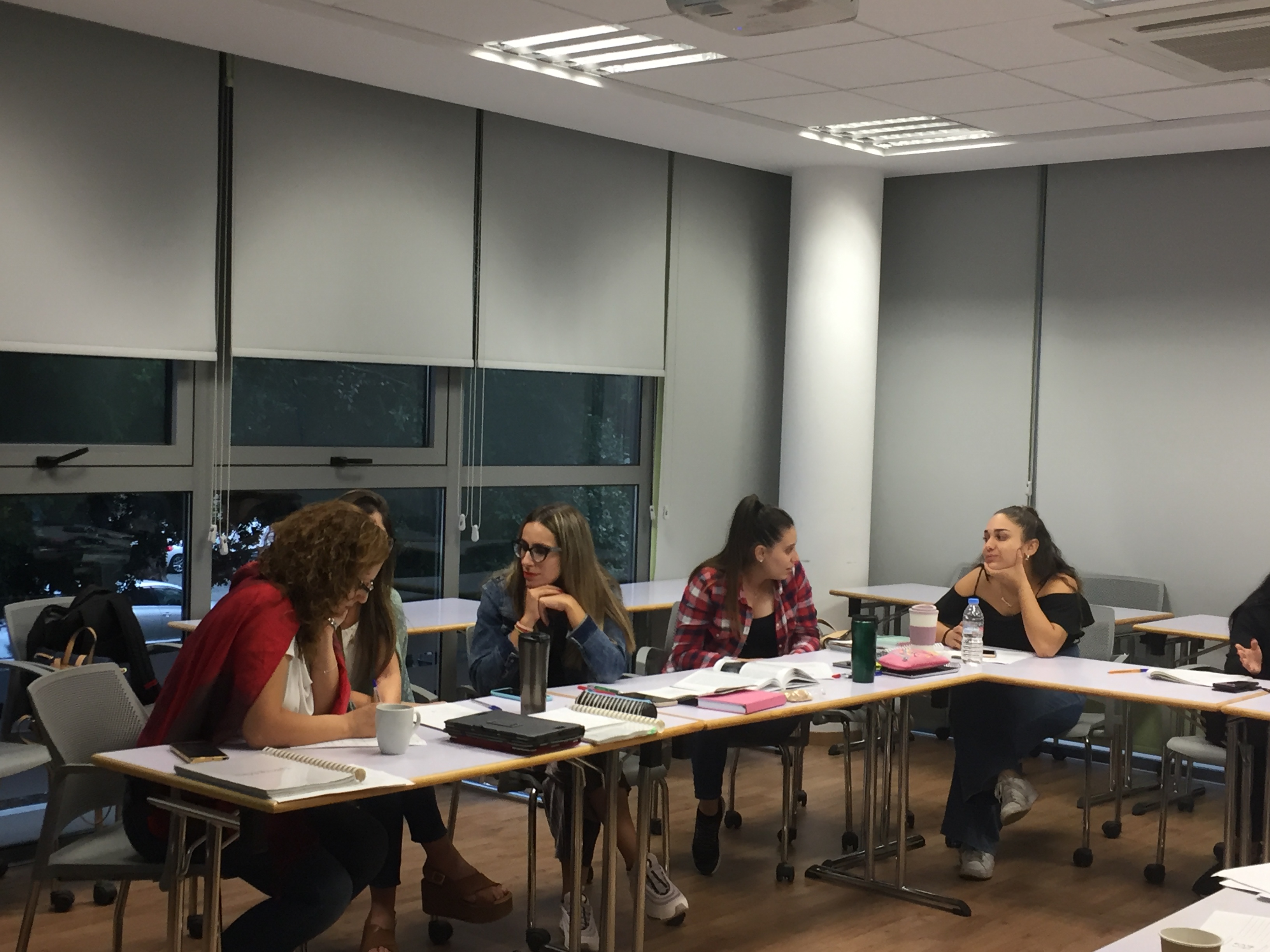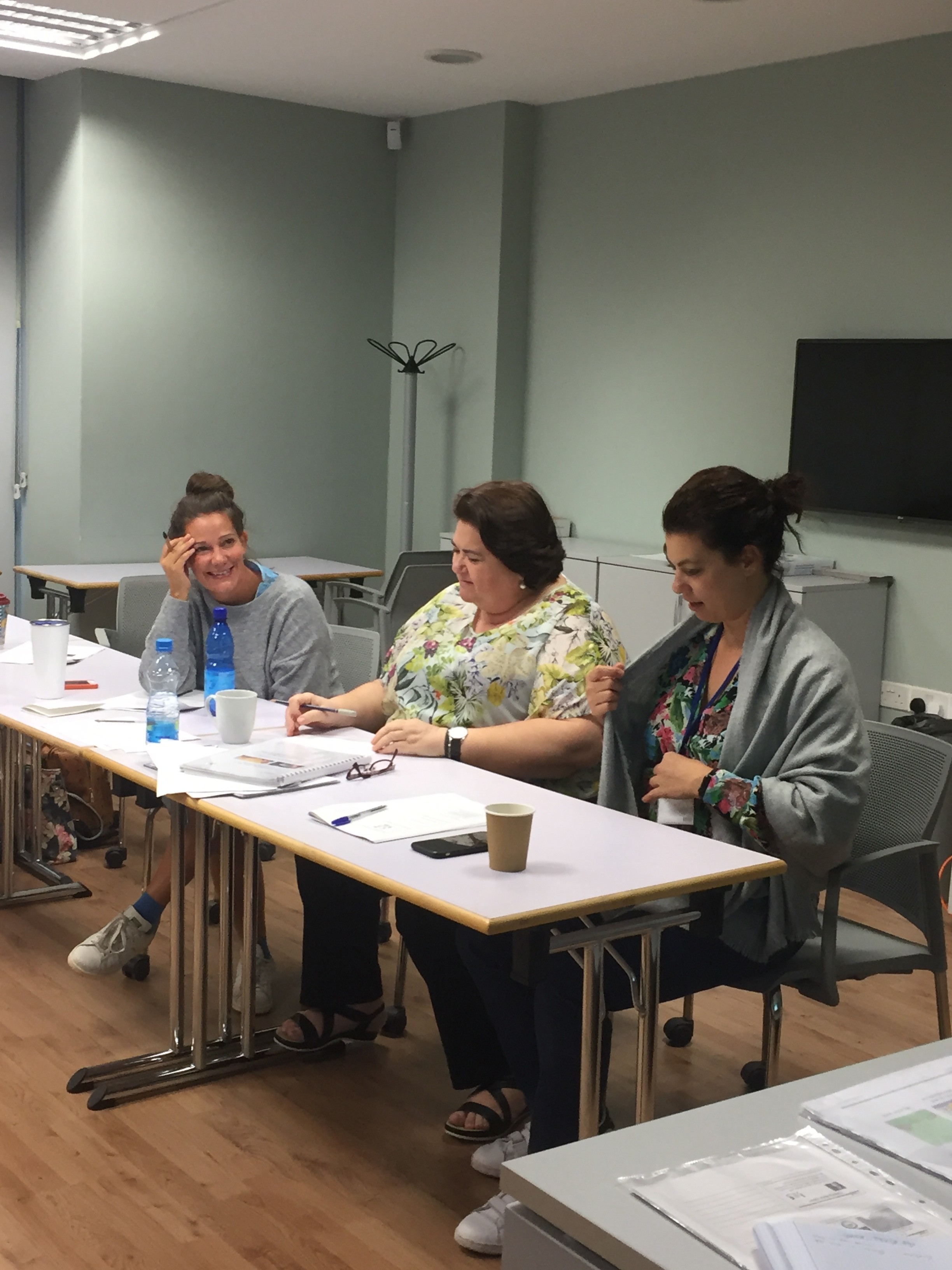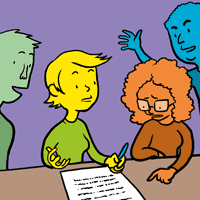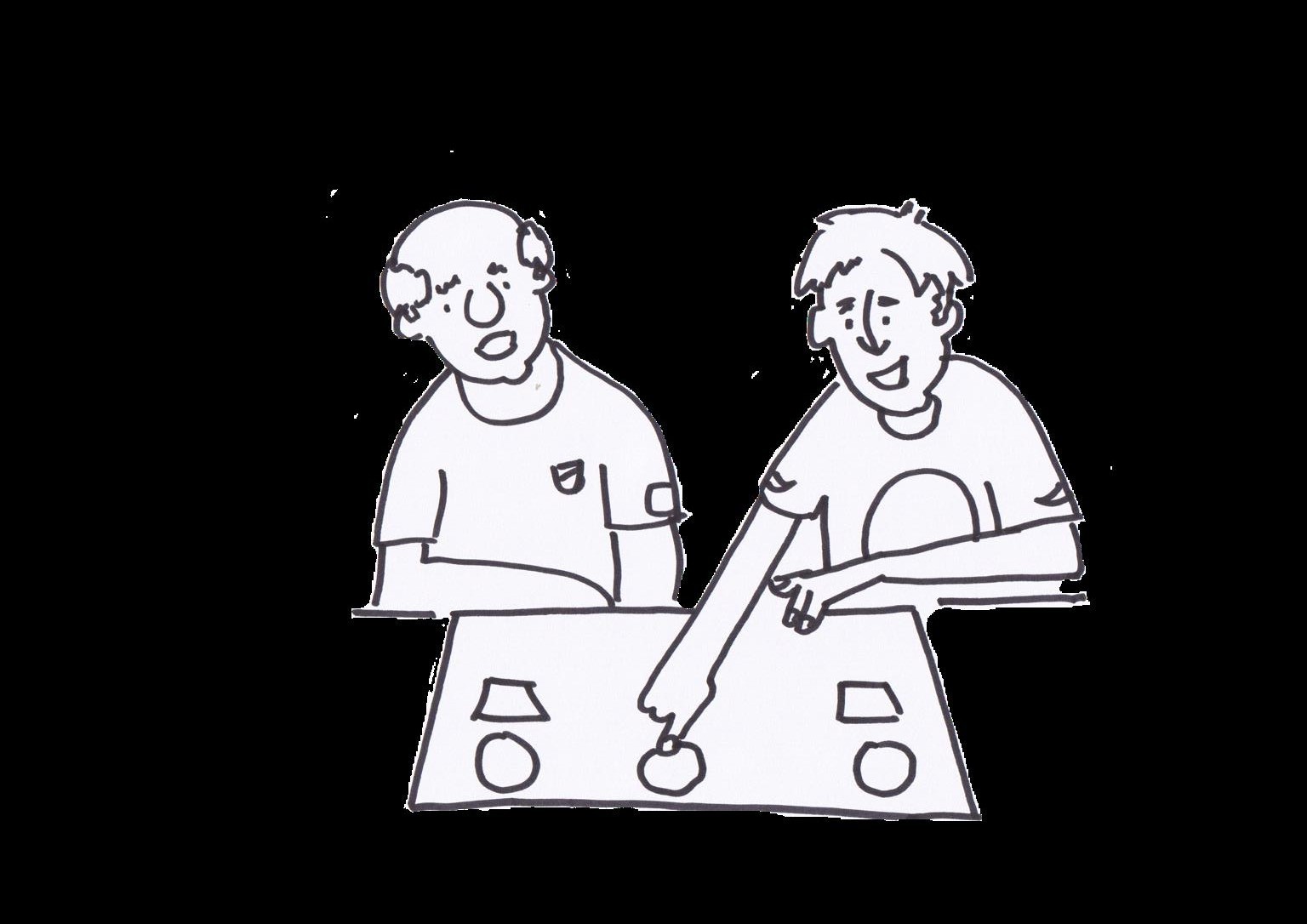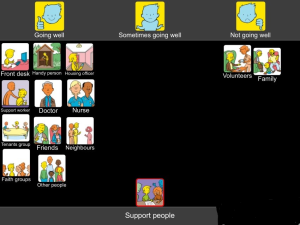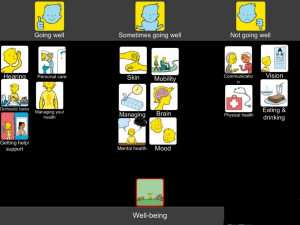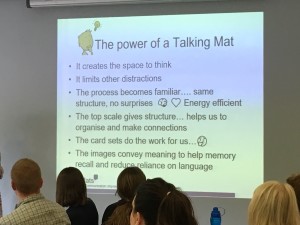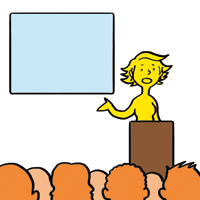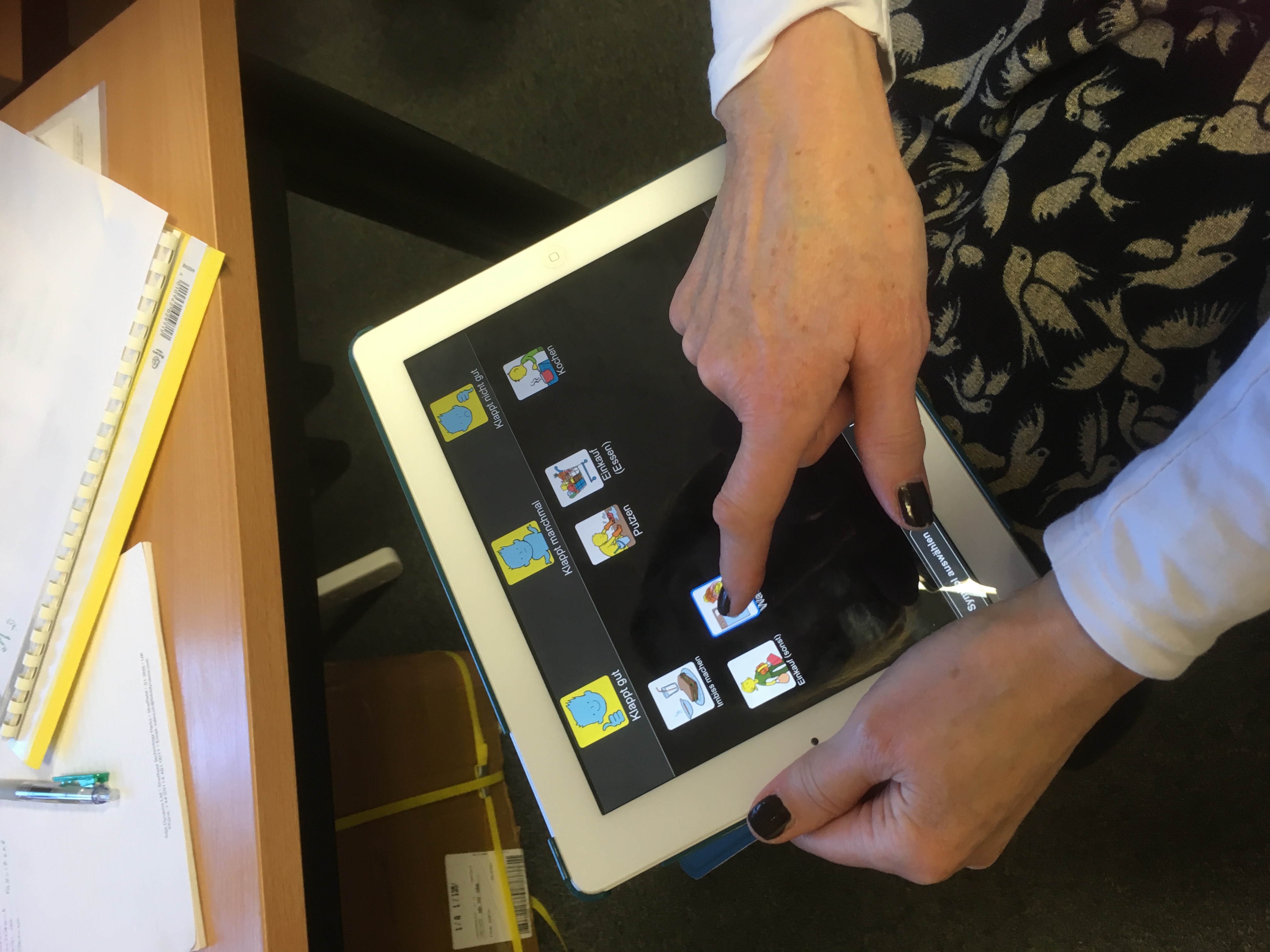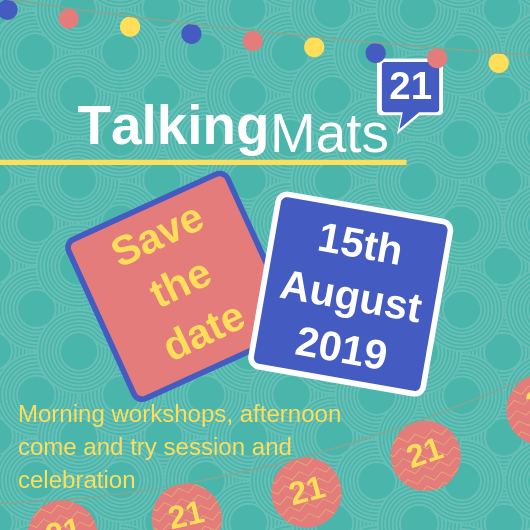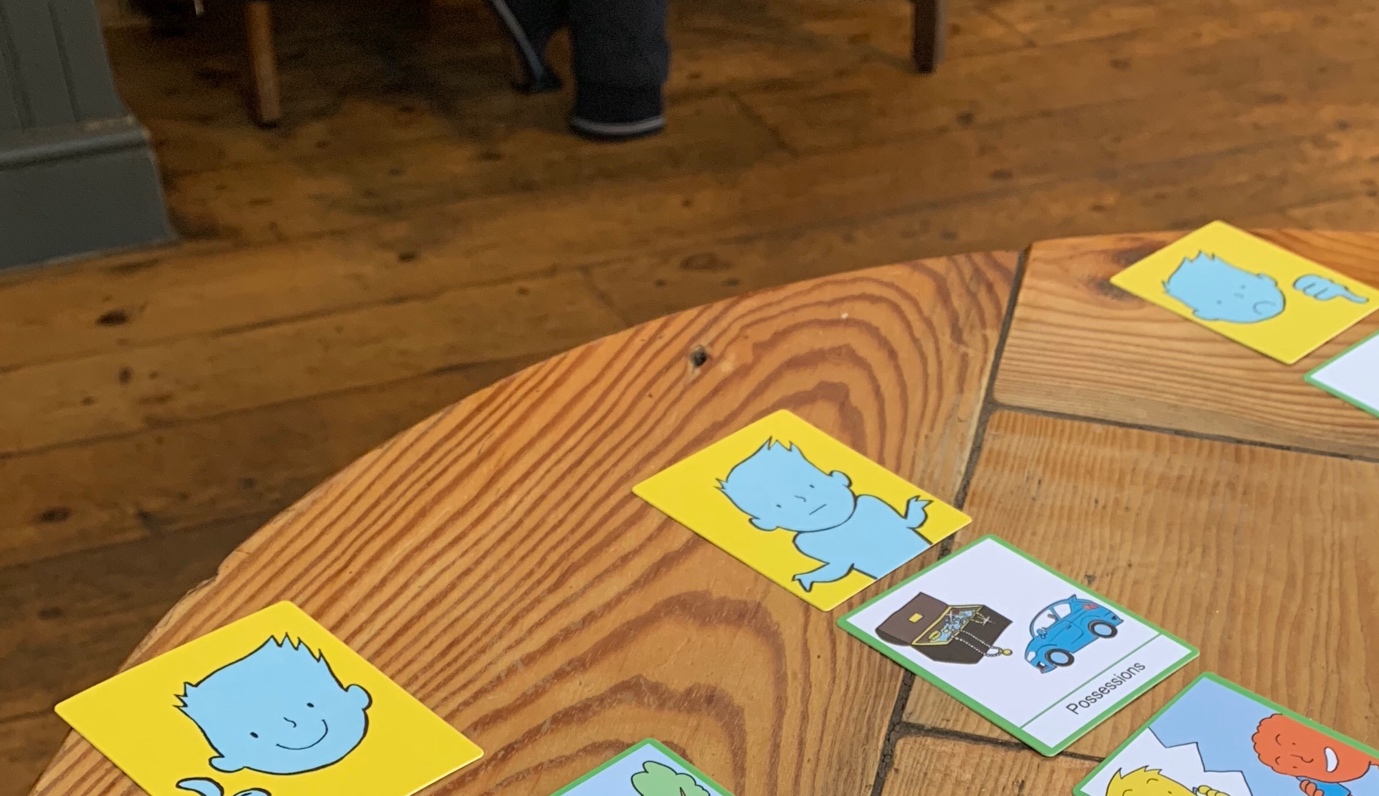In our latest blog, Rachel Woolcomb, Talking Mats OT Associate, discusses how Talking Mats can support Reflective Practice for Occupational Therapists.
Taking time out to stop and reflect on our practice can be a challenge. We convince ourselves there are more important things to do, people to see, targets to meet, and therefore we just don’t have the time.
However, I suggest, that with this mind set we are doing ourselves, and the people to whom we provide support and care, a disservice.
Clinical supervision has always been embedded in the culture of occupational therapy and at its best should create a safe and supportive environment in which reflective practice can take place.
Unfortunately, in practice, the reality can look different.
The more I have used Talking Mats to enable my clients to think and express their opinions, the more I have been convinced, that there is also great benefit to them being used within the clinical supervision process.
I want to thank the occupational therapists who agreed to explore this further with me. They used Talking Mats to think about their coping skills at work, or reflected on how their ability to learn and think, impacted their job role.
They were surprised how easy they found it to think about the full breadth of their working life and the impact this had on their wellbeing. As clinicians, we are great at looking after other people and ensuring that their health and wellbeing needs are met, however, we are not so great at caring for ourselves.
The latest TMOT resource provides more information about why and how, Talking Mats can be an effective tool in enabling a reflective thinking space for clinicians. Check it out here: TMOT3 Reflective practice
Give it a go… You are worth it!
To find out more about our Talking Mats resources, check out this link:
https://www.talkingmats.com/shop/
Many thanks to our Talking Mats Founder, Dr Joan Murphy, for this latest blog talking about the training course she recently delivered at the Cyprus University of Technology.
Cyprus is a beautiful Mediterranean island with a population of approximately 1 million.
I was invited by Dr Eliada Pampoulou to run a 2-day course on Talking Mats for 12 Speech and Language Therapists, some of whom are masters students and some, lecturing staff at the Cyprus University of Technology. The Cyprus University of Technology founded the first Department of Rehabilitation Sciences in Cyprus and the Department offers the first public recognised university bachelor degree in Speech Language Therapy / Speech Language Pathology in the Greek language (https://www.cut.ac.cy/faculties/hsc/reh/).
Day 1 was a Talking Mats foundation training course and Day 2 focused on discussion around capacity, research and clinical applications. This model worked very well as the participants were able to think about and discuss how to apply the training immediately.
Some of the immediate plans of the participants were both clinical and research oriented and are outlined below:
- To administer the Greek Stroke and Aphasia Quality of Life Scale (SAQOL-39) with healthy people over 50 both with the text version and an adapted Talking Mats version quality and to examine which they prefer.
- To use Talking Mats both with people with people with aphasia and their carers in order to share their understanding about the communication skills and needs of people with aphasia.
- To use Talking Mats as a tool to identify the factors that are related to AAC system acceptance or abandonment by focusing directly to the views of people with complex communication needs
- To use Talking Mats as a goal setting tool for both paediatric and adult population
- To use Talking Mats to gets clients feedback about therapy services
- To use Talking Mats for student appraisals regarding their clinical training
Dr Eliada Pampoulou has created the first Talking Mats centre in Cyprus which aims to gather all people who received training every few months to share their experiences and support each other to embed Talking Mats in practice and research.
We hope that Eliada will come to Stirling next year to gain her Talking Mats licence to enable her to train others and extend the reach of Talking Mats even further.
We regularly run our Licensed Trainer 2-day courses at our base in Stirling – if you have attended Talking Mats Foundation Training and would like to train other people find out more here:
https://www.talkingmats.com/training/train-the-trainers-accredited-training/
Many thanks to Lynn Blair, SLT (NHS North Lanarkshire) for writing this guest blog describing a recent project in which she and her colleagues used Talking Mats to gather the thoughts of secondary-aged pupils with social, emotional and behavioural support needs:
Do you remember your school janitor? Was he/she a cheery soul who you enjoyed talking to? Perhaps there was another member of school staff who you trusted and felt you could chat with. Secondary school can be a challenging environment for any teenager, let alone those who have speech, language and communication needs (SLCN). Young people need adults in their lives who they can feel at ease talking with.
The purpose of our recent project (See Lanarkshire SLT SEBN Poster 2019 and Lanarkshire SEBN Project Summary) was twofold. Firstly we wanted to find out how many of the young people in our local secondary schools for pupils with social, emotional and behavioural needs (SEBN) had language and communication difficulties. We also wanted to hear about the impact of those support needs by gathering the thoughts of the pupils themselves and that’s the focus of this blog.
We have to admit we were a bit anxious before we met with the pupils. Would these young men and women even give us the time of day with our friendly faces, mats and pictures? In the actual event, for the most part the tool was met with curiosity and then full engagement. The young people quickly grasped the idea. Some did not speak at all as they placed the images and others used the opportunity to tell us a great deal about how they felt about talking to different people in their lives and in different settings.
The information that we gathered is now being used to plan evidence-based speech and language therapy services to the school and young people. The use of Talking Mats gave us interesting information like the fact young people felt auxiliary staff such as janitors and assistants are often easier to talk with than teachers and as a result, we are thinking about how we involve all school staff in future events.
We are only too aware that the young people we met have often felt excluded from other people and from certain places. Talking Mats gave them the opportunity to be heard and we’re excited to consider how we can use them in the next phase of our work to support their communication needs.
If you are feeling inspired and would like to find out more about accessing Talking Mats Training – check out this link here: https://www.talkingmats.com/training/
Many thanks to Susan Gowland, SLT at NHS Fife Forensic Learning Disability Service, for this guest blog summarising the fantastic presentation she delivered at our TM is 21 event in August 2019.
As a speech and language therapist within NHS Fife’s forensic learning disability service, I work across two low secure wards. In my presentation for the “Talking Mats is 21 event” I talked about the way in which Talking Mats is used within these wards and the positive impact this has had for staff and patients.
Regular Check In: “it’s the same questions, but it’s easier to talk with the pictures”
Some of the people I work with use Talking Mats as a regular check in tool. Conversations are often based around the Wellbeing, Relationships and Thoughts and Feelings cards of the Keeping Safe resource, with personalised adaptations agreed with the thinker. Some people who find it difficult to express how they are feeling and irritations can either build up to a serious incident or the person can get weighted down by unexpressed needs and concerns. For these people a regular check in can address the small things before they become big things. This can help the thinker feel listened and responded to, build experiences of communicating effectively, as well as trust and therapeutic relationships, all of which are assets which will support the person to move on.
Self Reporting: “It helps me understand how I’m feeling about things”
For some people, the check in can have a specific focus. In a hospital based forensic service, unexpected and unrecognised changes in mental health can lead to serious incidents. To address this we have used Talking Mats to talk about mental health. SLT have worked with individuals, psychiatry & nursing to identify personal symptoms of mental health changes. These symptoms become options in the Talking Mat & can be used to support person to self report at the times their mental health changes. Being able to do this enables people to discuss the support they need & reduce the risk of out of the blue incidents. The Talking Mat itself can be a support. As one thinker said, “Talking Mats relaxes you, it calms you down”.
As and when required:
The regular use of Talking Mats on the ward has led to other patients asking for Talking Mats sessions. As a licensed trainer I offer training to all professionals within our multi-disciplinary team and there is often at least one Talking Mats trained nurse on shift. This means ad hoc requests can be facilitated and some thinkers have started using Talking Mats in weekly meetings; as a tool to talk through emotional events and as a way of exploring the mixed emotions around discharge. In the words of one of the charge nurses:
“Talking Mats has enabled me to communicate with people in a way that is meaningful. To support someone to express and understand their thoughts and feelings regarding both joyous and distressing events is a privilege. The format may be simple, but the outcome is often comprehensive and insightful.”
(Picture drawn by Fiona Glanville, staff nurse, NHS Fife)
If you would like to find out more about accessing Talking Mats training, check out this link:
https://www.talkingmats.com/training/
If you are interested in our Keeping Safe resource mentioned here (available to those who have accessed our Foundation Training / Online Training Course) please see these links for more details:
https://www.talkingmats.com/keeping-safe-a-new-talking-mats-resource-available-to-purchase/
https://www.talkingmats.com/product/keeping-safe/
Recently, Associated Prof. Ida Marie Mundt from Denmark completed our Talking Mats licensed trainer course. She has been looking at the theories which underpin Talking Mats and is planning to publish her work. One of the areas she speaks about is Identity.
In this blog, our Talking Mats Associate Rhona Matthews explores the area of Identity:
How do I know who I am? This is learned from actions, behaviour and language firstly with parents and family, then with friends.
For people who have difficulty interacting, this becomes much more difficult. There is a danger that others construct their identity.
A participant on our online training wrote about her experience of doing a Talking Mat for the first time with a girl who uses augmentative communication. She has a severe difficulty expressing her ideas and thoughts.
The topic was leisure activities and the top scale was things I like to do/ don’t like to do. She did this quickly and with no great surprises. The listener felt she didn’t get particularly useful information.
So she repeated the topic but with a different top scale. Things I am good at/Things I’m not good at.
Not surprisingly there was overlap with the earlier attempt. i.e. the things she felt good at, she liked which included horse riding.
Again the listener felt there was more conversation to be had! The thinker coped easily with another change of top scale which was things I want to get better / don’t want to get better at.
This time when the option of horse riding was handed over, the thinker became very animated, nodding in agreement. Not only did she want to improve her horse riding skills but wanted to learn about looking after horses. Her family had no idea that actually she didn’t just like riding but saw herself as a rider. This was part of her identity.
As Assoc. Prof. Ida says, Talking Mats offers a possibility to talk about who you are, and get other peoples’ responses.
If you are interested in accessing Talking Mats training we offer a variety of options, including online – check these out here: https://www.talkingmats.com/training/
Talking Mats as a Thinking Tool
In the first of a series of blogs showcasing some of the fantastic presentations delivered during our Talking Mats is 21 event on 15th August 2019, our OT Associate Rachel Woolcomb shares her thoughts on thinking – and how Talking Mats can help:
Recently I have been giving some thought to the process of thinking!
Is thinking just a matter of the neural pathways in our brains manipulating information about ourselves and the world, to create an output or action? or is it more than that?
Can we overthink? Is being spontaneous under thinking? What about creative thinking?
At the Talking Mats is 21 celebrations I explored this subject and looked at how Talking Mats can be used effectively as a tool to support thinking.
My presentation – Talking Mats as a Thinking Tool – looked at the mechanics of thinking, and started to explore how as humans we don’t just learn facts but begin to understand and make sense of them within the context of our culture and environment.
Thinking is effortful and depending on the subject we need to think about can be complicated and demanding.
Using a Talking Mat creates the space to think, it helps to reduce other distractions and provides a structure for thinking. This means that the process of thinking becomes energy efficient as a Talking Mat enables the thinker to organise their thoughts and make connections that otherwise might not be identified or explored. The images used in the topic sets help with memory recall and are designed to expand a subject. This reduces the reliance on language and the need to express what we are thinking verbally.
The Talking Mat forms a visual picture of our thinking which is helpful for reflection and further exploration of the subject.
The final few slides in my presentation contain some quotes from occupational therapists who have used Talking Mats within their supervision sessions to enable them to think about their coping skills and strategies whist at work. I will soon be sharing a resource document on the use of Talking Mats as a reflective space for clinicians.
For further details about our Talking Mats is 21 event and presentations check out our recent blog – https://www.talkingmats.com/amazing-talking-mats-is-21-day/
If you are interested in accessing Talking Mats training, follow this link for more details of the options we can offer – https://www.talkingmats.com/training/
Watch this space for more information from the presentations delivered at our #TMis21 Event!
Talking Mats have been part of an exciting research project which looked at whether the Digital Talking Mat App could improve health and housing outcomes for social housing tenants.
Working together with tenants and staff from Loretto Housing and Care, Stirling University, Napier University and Age Scotland we have developed and piloted a new Talking Health and Housing set for the Talking Mats App!
Project Aims
The aim of the project was to:
- Develop an App that would support social housing tenants with communication difficulties to say what they thought about their Housing and Health.
- To improve communication between social housing tenants and health professionals.
Researchers were also keen to see whether the App would help to demonstrate the link between tenants’ housing and health solutions.
What we did
The Talking mats team facilitated two focus group sessions with all the partners to decide what topics were needed.
Once the mats had been completed the researchers from Stirling University and Napier University conducted interviews and focus groups with staff from Loretto and related Health professionals and then analysed the data from the mats.
The Talking Health and Housing set
The set has three topics: Home, Wellbeing, Support people
The Top scale for this set is Going well…Going well sometimes…Not going well
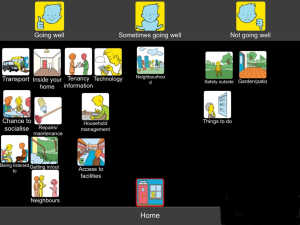
- A broken stair door
- Uneven pavement outside the house,
- Poor eyesight
- Poor mobility
This was having a negative impact on tenants’ wellbeing and by doing the mats, actions were identified to address all these concerns and anxieties were reduced.
It was a great partnership and we hope to work together again to further explore how the App can support the Service Integration agenda by facilitating communication between Health, Social and Care and Housing with the tenant at the centre.
Read the summary report 201908 Talking Health and Housing Summary Report
If you are interested in finding out more about the Talking Health and Housing App please email info@talkingmats.com
The Symbols are designed and © to Adam Murphy 2015 and assigned to Talking Mats Ltd. in perpetuity. They may not be reproduced without permission
What an amazing day we had celebrating 21 years since the first article about Talking Mats was published in August 1998 in the Communication Matters journal. Over 180 people attended from so many different walks of life. We are grateful to them all for coming and helping us mark the occasion. We are also grateful to the endowment fund of Forth Valley NHS for helping us fund the event.
In the morning thanks to a fantastic group of speakers we discussed a diverse range of topics:
- Rachel Woolcomb, our OT associate explored how she sees Talking Mats as an ‘energy efficient’ thinking tool and outlined how it supports people to think through issues Talking Mats as a Thinking Tool
- Two teachers, Fiona Graham and Claire Forgan examined the benefits and challenges of embedding Talking Mats in school to encourage and extend pupil participation
- Susan Gowland, a speech and language therapist discussed the use of Talking Mats in a forensic setting illustrating from a case example how Talking Mats helped staff see that incidents do not come out of the blue. When they looked at the pattern of mats over time they could see when the patient was expressing concern about small things. This was an indication that bigger things were going on for him.
- Sally Boa the Research Manager for Strathcarron Hospice led on how Talking Mats was a way to enable ‘end of life’ conversations, things that can be hard for any of us to talk about. The mats give a safe space and structure to enable these conversations to take place. Talking Mats and Palliative care
- Two parents Tracey Campbell and Sarah Robertson spoke about their experience with using Talking Mats with their children. Sarah said ‘Talking Mats gives us a happier home. It helps me be patient, listen and give power to him’ (her son). Talking Mat A Parents View 15.08.19
- Jill Bradshaw of the Tizard Centre, University of Kent outlined her research including her work exploring Talking Mats as a tool to sit beside functional analysis of behaviour where the person’s own view of what challenges and helps them is often overlooked and not included fully. TM and PBS final version for handout
- Anne Lafferty of The Advocacy Project , give a powerful example of using Talking Mats in a legal setting. This important work is in need of funding so we can explore this more fully. Everyone also got to play legislation bingo! Talking Mats and Supported Decision Making PP 2
- Liz Taylor (Talking Mats licensed trainer) and Lynnette Linton (Talking mats co-trainer) from The Action Group shared their experience in a fantastic film. They used a Talking Mat to reflect on the experience and would recommend co-training as an effective way to deliver the Foundation course.
- Brian Robertson and Paddy Carstairs described how they developed a Talking Mats to allow members of the National Involvement Network to explore with other people with a learning disability how The Charter for Involvement related to their life experience.This is an empowering way of using Talking Mats that shows that people who get support can help change and improve the support of other supported people.This is an empowering way of using Talking Mats that shows that people who get support can help change and improve the support of other supported people.
- Rosie Noyce from Pennine Care NHS described a whole team approach to supporting Healthy Young Minds and how they have embedded Talking Mats into their care pathway. She cited powerful case examples of impact and a real commitment by the team to hear the voices of young people Talking Mats and Young People’s Mental Health
And that was just the morning! Lots of delegates have asked for copies of the presentations so watch this space
The afternoon demonstrated just how far Talking Mats has come through its partnerships with other organisations. We are so grateful to all the people who came and had stalls and engaged with our networking activities! There was a real buzz in the room as people explored the variety of ways in which Talking Mats is used to support and enable more effective communication. Lots of connections were being made, people thinking about new ways of working and applying Talking Mats in their settings. People enjoyed seeing old friends but was good to see new networks were being built.
So, thank you Care Opinion, Turning Point Scotland, The Action Group, Capability Scotland, The CALL Centre, The Indigo Group, The National Involvement Network, Forth Valley NHS, The Stirling University Careers Service and Alzheimer Scotland. In addition, Talking Mats had a stand with all its products. Also, to promote our Birthday offer since we are 21, we have a 2 for 1 offer on resources for 21 days so order quickly. It ends on the 5th of September!
Today was also the day that Joan marked her ‘retirement’. 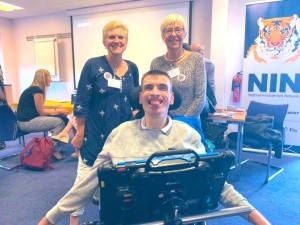
Talking Mats is now used in many countries all over the world. As part of our #TMis21 blog series, we wanted to share this great example of Talking Mats being used in Germany.
In March 2019 Prof. Dr. Norina Lauer (OTH Regensburg) and Elena Maxheimer held a lecture and a workshop about Talking Mats at the “aphasia days” in Wuerzburg, Germany. Many thanks to Norina and Elena for sharing information about the “aphasia days” for this blog post.
The “aphasia days” are a large congress – unique in Europe – for people with aphasia, family members and speech and language therapists (SLT). Every year around 600 people from Germany, Austria, Switzerland and Hungary are coming to this event. There are talks, workshops and podium discussions held by participants with aphasia, family members or SLTs. In front of approx. 150 listeners Norina and Elena gave a lecture about Talking Mats and the results of Elena’s bachelor thesis, in which she worked with people with aphasia, who learned to use Talking Mats.
In a three-hour workshop at the “aphasia-days” Norina and Elena taught nine people with moderate to severe aphasia how to use Talking Mats. All persons brought their own tablets and logged into their own account. They where shown how to choose a topic and a top scale and practiced in teams of two. All of them conducted several sessions with different topics and switched partners a couple of times. They had a lot of fun talking about things that matter to them and learn more about their peers. At the end of the workshop they were able to use Talking Mats themselves and are going to use it with their relatives and friends at home. As the workshop was very well received by the participants, it is likely to be repeated at the next “aphasia days” 2020.
If you would like to find out more information about Talking Mats in Germany, and the Digital Talking Mats app which is now available in German, check out https://www.talkingmats.com/talking-mats-in-germany/ and https://www.talkingmats.com/german-digital-talking-mats-with-people-with-aphasia/
Our Talking Mats is 21 Event is in Stirling on Thursday 15th August 2019. Thanks to funding from NHS Forth Valley endowment committee the event is free but you do need to book your space https://www.eventbrite.co.uk/e/talking-mats-is-21-tickets-62362171935
You can come to the morning only, afternoon only or come for the whole day.
If you can’t come to our event watch out for out blogs and social media celebrating the reach of Talking Mats for 21 days before the 15th of August. Please join in with your contributions using the hashtag #TMis21. For 21 days after our event we will be having a special Birthday offer! Watch this space, more to follow …….
Rachel Woolcomb, our Talking Mats OT Associate, shares a recent personal experience where she used Talking Mats to support a difficult conversation:
The vision of Talking Mats is to improve the lives of people with communications difficulties. I have been reflecting recently on the definition of ‘communication difficulties.’
When I first heard about, and started to use Talking Mats 10 years ago, my perception was that it was fantastic for those that could not speak but I must admit I didn’t really consider using it with people who, such as myself, could use their voice to communicate.
Over the years as my understanding has developed, and I have looked further into the use of Talking Mats as a ‘thinking tool’ I have come to a different conclusion.
I would like to suggest that at some points in our lives, each one of us is likely to experience a communication difficulty. I don’t mean that we cannot physically speak, but that we cannot express what we really want to say in words. Perhaps a topic is too difficult to talk about with someone so we don’t bother, or we are overwhelmed by the subject that we don’t really know where to start.
One such subject is that of death and dying.
We know it will happen to us all one day but to talk openly with loved ones, is for some reason, too much to comprehend, too emotive, or considered bleak.
I am very fortunate enough to have grandparents in their 90’s however the conversation about their wishes for the future goes unspoken. It is a challenge for my parents to raise the issue therefore it remains the big unknown.
This is a common problem. In 2009, The National Council for Palliative Care wanted to address this issue and set up the Dying Matters Coalition in England and Wales, to help people talk more openly about dying, death and bereavement and to make plans for the end of life.
Talking Mats have produced a set of topic cards called ‘Thinking Ahead.’ https://www.talkingmats.com/product/thinking-ahead/
These were created in consultation with Strathcarron hospice to help people with advanced illness or long term conditions to think ahead and plan for the future. The three topics in the set are: Affairs, Care and Treatment and Personal Values.
My Mum was interested in my role with Talking Mats and wanted to understand what it was all about. We had already started to talk about the challenges of having difficult conversations, especially about death, and therefore over a drink, in a relaxed coffee shop, we embarked on a journey of discovery using a Talking Mat. My Mum as the Thinker and myself as the Listener .
She used the Talking Mat to help her think about things she had not considered and was able to make plans about what she wanted to do next. I heard her wishes and her thoughts, on why certain things were important to her. It was a very special time, facilitated by a Talking Mat.
My challenge to you as readers of this blog is to ask yourself ‘what do I have difficulty talking about’ – A Talking Mat just might be the answer!
Another resource you might find helpful is ‘Let’s Talk about Death and Dying’ – www.ageuk.org.uk
Rachel will be running a ‘Talking Mats as a Thinking Tool’ workshop at our Talking Mats is 21 Event is in Stirling on Thursday 15th August 2019. Dr Sally Boa from Strathcarron Hospice will also be running a ‘Talking Mats in End of Life Care’ workshop at this event. Thanks to funding from NHS Forth Valley endowment committee the event is free but you do need to book your space https://www.eventbrite.co.uk/e/talking-mats-is-21-tickets-62362171935
You can come to the morning only, afternoon only or come for the whole day.
If you can’t come to our event watch out for out blogs and social media celebrating the reach of Talking Mats for 21 days before the 15th of August. Please join in with your contributions using the hashtag #TMis21. For 21 days after our event we will be having a special Birthday offer! Watch this space, more to follow …….
 Online training login
Online training login 

